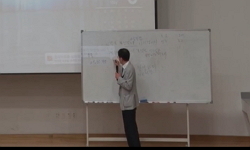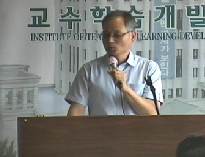근대 이후 자연법론과 역사법학은 서로 다른 각각의 방법으로, 즉 이성으로부터의 연역적 법발견 또는 실정적 법소재로부터의 역사적-체계적 법발견을 통해, 법의 학문화(이론화)를 추구하...
http://chineseinput.net/에서 pinyin(병음)방식으로 중국어를 변환할 수 있습니다.
변환된 중국어를 복사하여 사용하시면 됩니다.
- 中文 을 입력하시려면 zhongwen을 입력하시고 space를누르시면됩니다.
- 北京 을 입력하시려면 beijing을 입력하시고 space를 누르시면 됩니다.
https://www.riss.kr/link?id=A82754962
- 저자
- 발행기관
- 학술지명
- 권호사항
-
발행연도
2008
-
작성언어
Korean
-
주제어
자연법론 ; 역사법학 ; 판덱텐법학 ; 칸트 ; 사비니 ; Natural Law ; Historical School of Law ; Pandektistik ; Kant ; Savigny
-
등재정보
KCI등재
-
자료형태
학술저널
-
수록면
49-71(23쪽)
-
KCI 피인용횟수
3
- DOI식별코드
- 제공처
- 소장기관
-
0
상세조회 -
0
다운로드
부가정보
국문 초록 (Abstract)
무엇보다 자연법론과 역사법학-판덱텐법학 사이에서 칸트가 매개한 바는 무엇인가라는 물음에 대해서는 윤리적-방법적 합리주의라고 답할 수 있다. 방법적 합리주의의 차원에서 칸트의 이성비판적 인식론이 법학의 가능조건의 문제를, 즉 법학의 학문성(Wissenschaftlichkeit)의 기준을 의식케 했다면, 윤리적 합리주의의 차원에서는 칸트의 全실천철학 체계를 매개로 하여, ‘자유의 근본성’과 ‘법의 독자성(자율성)’이라는 법의 윤리적 기초가 재인식될 수 있었다.
그런 점에서, 법의 이상과 목적으로부터가 아니라 실정법의 ratio juris로부터 개념과 원리를 도출해내는, ‘논리’를 통한 법발견을 고수한 19세기 실정법학의 방법적 자율성과 자기완결성은 자연법의 유산이라기보다는 칸트에서 비롯된 방법적 합리주의의 유산이라고 할 수 있다.
방법적 합리주의의 맥락에서 칸트의 순수이성비판과 도덕형이상학의 법론이 ‘자연법의 극복’을 매개하였다면, 윤리적 합리주의의 차원에서 사법학의 윤리적 기초가 되었던 것은 칸트의 실천이성비판과 도덕형이상학원론이었다. 칸트의 ‘인격성의 도덕적 자율’로부터 도출된 형식적 의무윤리 및 자유윤리에 의해 舊이성법의 실질적 사회윤리가 대체되었으며, ‘도덕적 자율성’의 실현을 가능케하는 자유의 공존조건으로서의 법개념을 통해 역사법학 및 판덱텐 법학, 특히 사비니의 사법이론에 윤리적 전제가 마련되었다는 평가가 가능할 것이다.
근대 이후 자연법론과 역사법학은 서로 다른 각각의 방법으로, 즉 이성으로부터의 연역적 법발견 또는 실정적 법소재로부터의 역사적-체계적 법발견을 통해, 법의 학문화(이론화)를 추구하였다. 그 과정에서 궁극적으로 학문성의 문제는 學의 보편적 대상의 문제가 아니라 學으로서의 형식과 방법의 보편성의 문제임을 지적한 것이 칸트였으며, 법에서의 이성성-역사성-개념논리성의 추구와 발견이 곧 법발전의 계기들임을 學的으로 보여준 것이 근대法學의 공로라고 할 수 있다.
무엇보다 자연법론과 역사법학-판덱텐법학 사이에서 칸트가 매개한 바는 무엇인가라는 물음에 대해서는 윤리적-방법적 합리주의라고 답할 수 있다. 방법적 합리주의의 차원에서 칸트의 이성비판적 인식론이 법학의 가능조건의 문제를, 즉 법학의 학문성(Wissenschaftlichkeit)의 기준을 의식케 했다면, 윤리적 합리주의의 차원에서는 칸트의 全실천철학 체계를 매개로 하여, ‘자유의 근본성’과 ‘법의 독자성(자율성)’이라는 법의 윤리적 기초가 재인식될 수 있었다.
그런 점에서, 법의 이상과 목적으로부터가 아니라 실정법의 ratio juris로부터 개념과 원리를 도출해내는, ‘논리’를 통한 법발견을 고수한 19세기 실정법학의 방법적 자율성과 자기완결성은 자연법의 유산이라기보다는 칸트에서 비롯된 방법적 합리주의의 유산이라고 할 수 있다.
방법적 합리주의의 맥락에서 칸트의 순수이성비판과 도덕형이상학의 법론이 ‘자연법의 극복’을 매개하였다면, 윤리적 합리주의의 차원에서 사법학의 윤리적 기초가 되었던 것은 칸트의 실천이성비판과 도덕형이상학원론이었다. 칸트의 ‘인격성의 도덕적 자율’로부터 도출된 형식적 의무윤리 및 자유윤리에 의해 舊이성법의 실질적 사회윤리가 대체되었으며, ‘도덕적 자율성’의 실현을 가능케하는 자유의 공존조건으로서의 법개념을 통해 역사법학 및 판덱텐 법학, 특히 사비니의 사법이론에 윤리적 전제가 마련되었다는 평가가 가능할 것이다.
다국어 초록 (Multilingual Abstract)
It allows the conclusion that the methodological autonomy of the positive legal science that is the main issue of the Historical School of Law and Pandektistik does not originate from the modern concept of Natural Law but from Kant"s idealistic and dualistic concepts.
On the one hand Kant insists on the fundamentality of freedom as the ethical formal basis of law, and on the other hand on the methodological autonomy of law itself as science. To that degree it can be said that Kant replaces not only the material social ethics of Natural Law with his formal ethics, but also he provides the ethical and methodological basis for the Historical School of Law and Pandektistik, especially for Savigny"s theory of private law.
The Historical School of Law devotes considerable effort towards elucidating the historical-systematic character of law. It rests mainly on Kant"s fundamental critique of the methodological concept of the modern Natural Legal Theory. Kant makes it cle...
The Historical School of Law devotes considerable effort towards elucidating the historical-systematic character of law. It rests mainly on Kant"s fundamental critique of the methodological concept of the modern Natural Legal Theory. Kant makes it clear that the main problem of the legal science is not simply a matter of the substantial ideal of law, but that of the universal form and methodology. His epistemological and ethical analysis of the capacity of human Reason leads to the elucidation of the objective measure of the legal "science" and to the formal definition of law.
It allows the conclusion that the methodological autonomy of the positive legal science that is the main issue of the Historical School of Law and Pandektistik does not originate from the modern concept of Natural Law but from Kant"s idealistic and dualistic concepts.
On the one hand Kant insists on the fundamentality of freedom as the ethical formal basis of law, and on the other hand on the methodological autonomy of law itself as science. To that degree it can be said that Kant replaces not only the material social ethics of Natural Law with his formal ethics, but also he provides the ethical and methodological basis for the Historical School of Law and Pandektistik, especially for Savigny"s theory of private law.
참고문헌 (Reference)
1 堅田剛, "歷史法學硏究:歷史と法と言語のトリア-デ" 日本評論社 1992
2 강희원, "역사법학과 Savigny" 慶熙法學硏究所 33 (33): 1998
3 이상수, "사비니에서 법의 역사성" 민속원 (23) : 2001
4 H. Coing, "Zur Geschichte des Privatrechtsystems, Frankfurt"
5 H. Kantorowicz, "Was ist uns Savigny? In: Rechtshistorische Schriften" Karlsruhe 1970
6 G. Radbruch, "Vorschule der Rechtsphilosophie, 2.Aufl., Gtingen"
7 H. Kantorowicz, "Volksgeist und historische Rechtsschule In: Rechtshistorische Schriften" Karlsruhe 1970
8 H. A. Rommen, "The Natural Law, New York"
9 F. C. v. Savigny, "System des heutigen rischen Rechts, Berlin"
10 H. Kantorowicz, "Savigny and the Historical School of Law In: Rechtshistorische Schriften" Karlsruhe 1970
1 堅田剛, "歷史法學硏究:歷史と法と言語のトリア-デ" 日本評論社 1992
2 강희원, "역사법학과 Savigny" 慶熙法學硏究所 33 (33): 1998
3 이상수, "사비니에서 법의 역사성" 민속원 (23) : 2001
4 H. Coing, "Zur Geschichte des Privatrechtsystems, Frankfurt"
5 H. Kantorowicz, "Was ist uns Savigny? In: Rechtshistorische Schriften" Karlsruhe 1970
6 G. Radbruch, "Vorschule der Rechtsphilosophie, 2.Aufl., Gtingen"
7 H. Kantorowicz, "Volksgeist und historische Rechtsschule In: Rechtshistorische Schriften" Karlsruhe 1970
8 H. A. Rommen, "The Natural Law, New York"
9 F. C. v. Savigny, "System des heutigen rischen Rechts, Berlin"
10 H. Kantorowicz, "Savigny and the Historical School of Law In: Rechtshistorische Schriften" Karlsruhe 1970
11 G. Radbruch, "Rechtsphilosophie, 8.Aufl., Stuttgart"
12 A. Kaufmann, "Rechtsphilosophie im Wandel, Frankfurt"
13 J. Schrer, "Recht als Wissenschaft, Mchen"
14 F. Wieacker, "Privatrechtsgeschichte der Neuzeit, 2.Aufl., Gtingen"
15 H. Eichler, "Personenrecht, Wien"
16 J. Rkert, "Idealismus, Jurisprudenz und Politik bei Friedrich Carl von Savigny, Ebelsbach"
17 I. Kant, "Grundlegung zur Metaphysik der Sitten, Kant's gesammelte Schriften (Akademie -Ausgabe) IV"
18 F. C. v. Savigny, "Grundgedanken der historischen Rechtsschule" Frankfurt 1948
19 H. Hattenhauer, "Grundbegriffe des Bgerlichen Rechts, Mchen"
20 E. Wolf, "Grosse Rechtsdenker der deutschen Geistesgeschichte, Tingen"
21 J. Rohls, "Geschichte der Ethik, Tingen"
22 H. Coing, "Die Privatrechtswissenschaft im 19. Jahrhundert in Europa, Opladen"
23 I. Kant, "Die Metaphysik der Sitten, Kant's gesammelte Schriften VI"
24 G. Radbruch, "Der Mensch im Recht, Gtingen"
동일학술지(권/호) 다른 논문
-
Rolf Knütel 저 / 신유철 역, 『로마법 산책』(유럽법학 1), 법문사, 2008
- 한국법사학회
- 서을오(서평자)
- 2008
- KCI등재
-
- 한국법사학회
- 남은혜
- 2008
- KCI등재
-
- 한국법사학회
- 서지영
- 2008
- KCI등재
-
- 한국법사학회
- 김기창(Kim, Kee-Chang)
- 2008
- KCI등재
분석정보
인용정보 인용지수 설명보기
학술지 이력
| 연월일 | 이력구분 | 이력상세 | 등재구분 |
|---|---|---|---|
| 2028 | 평가예정 | 재인증평가 신청대상 (재인증) | |
| 2022-01-01 | 평가 | 등재학술지 유지 (재인증) |  |
| 2019-01-01 | 평가 | 등재학술지 유지 (계속평가) |  |
| 2016-01-01 | 평가 | 등재학술지 유지 (계속평가) |  |
| 2012-01-01 | 평가 | 등재 1차 FAIL (등재유지) |  |
| 2009-01-01 | 평가 | 등재학술지 선정 (등재후보2차) |  |
| 2008-01-01 | 평가 | 등재후보 1차 PASS (등재후보1차) |  |
| 2007-01-01 | 평가 | 등재후보학술지 유지 (등재후보2차) |  |
| 2006-01-01 | 평가 | 등재후보 1차 PASS (등재후보1차) |  |
| 2005-01-01 | 평가 | 등재후보학술지 유지 (등재후보1차) |  |
| 2004-01-01 | 평가 | 등재후보학술지 유지 (등재후보1차) |  |
| 2003-01-01 | 평가 | 등재후보학술지 선정 (신규평가) |  |
학술지 인용정보
| 기준연도 | WOS-KCI 통합IF(2년) | KCIF(2년) | KCIF(3년) |
|---|---|---|---|
| 2016 | 1.1 | 1.1 | 0.94 |
| KCIF(4년) | KCIF(5년) | 중심성지수(3년) | 즉시성지수 |
| 0.81 | 0.76 | 1.284 | 0.33 |





 KCI
KCI DBpia
DBpia







